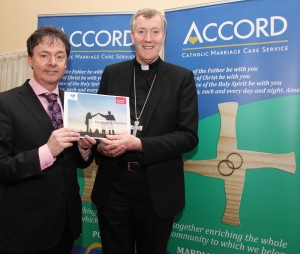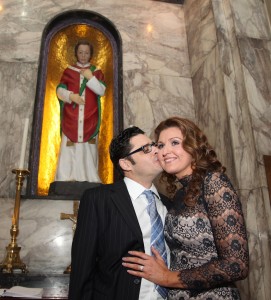
By Sarah Mac Donald - 11 February, 2015

At the Shrine of St Valentine in Whitefriar St in Dublin, engaged couple Leona Gallagher from Castledawson Co Derry and Paul McNulty from Beaumont in Dublin were blessed by Bishop Denis Nulty. Pic John Mc Elroy.
Family still matters to Irish people new research shows and most people still value the ideal of children being raised in homes with a loving father and mother.
A survey carried out by Amárach Research for ACCORD, the catholic marriage support agency, finds that marriage remains a desirable outcome for most people and most expect it to be for life.
This is despite the rising incidence of births outside marriage, cohabitation, divorce/separation and debate about same sex marriage.
A total of 54% of the 1,000 adults polled nationwide by Amárach said they didn’t agree that marriage is an “old-fashioned, out-moded institution”.
More people (61%) in 2014 agreed that couples who marry should make it a lifelong commitment to one another to be broken only under extreme circumstances than in a similar poll in 2006 (56%).
Agreement with lifelong commitment is actually higher among 25 to 34-year-olds than among several older cohorts the poll showed.
The survey findings also who that men are more committed to ‘marital commitment’ than women in 2014, even though both were equally committed in 2006.
Elsewhere, the poll found that 65% of Irish adults believe the best environment for children’s happiness is in a home with a loving father and mother.
Agreement tends to rise with age, but even among under 35-year-olds, nearly 6 in 10 agree.
Those with children are more likely to agree about the importance of loving parents, though those with older children are more likely to agree than those with younger children.
The president of ACCORD, Bishop Denis Nulty, described the findings as “a good endorsement of the institution of marriage and family life”.
The survey also shows a drop in the number of adults who believe couples should live together first in order to decide if they would suit being married, with 64% of those surveyed in 2014 agreeing compared to 67% in 2006.

Bishop Denis Nulty, President of Accord, at the launch of Amárach’s research findings on Irish attitudes to marraige and the family with Gerard O’Neill from Amarach Research in Whitefriar St Church in Dublin. Pic John Mc Elroy.
However, the percentage of people who believe couples who marry should make a lifelong commitment to one another to be broken only under extreme circumstances was higher than in 2006 at 61% than in 2014 at 54%.
Speaking ahead of ACCORD’s annual church gate collection this weekend, Bishop Nulty noted that among younger adults support for marriage is stronger than in the last such poll in 2006.
However, the poll revealed other challenges to the Church’s teachings.
The majority of those polled disagreed that couples who have children ought to be married – 43% compared to 32%. This was effectively a reversal of views from 2006, when 46% agreed and 30% disagreed.
In his address at the launch of the research findings, Bishop Nulty said married couples celebrating their silver, golden or diamond wedding anniversaries are rarely thought of as revolutionaries.
“Yet, according to Pope Francis, that is what they are. Aware that faithful and lifelong marriage is regarded by many as ‘out of fashion’ Pope Francis urged millions attending World Youth Day in Brazil a year and a half ago to “swim against the tide” and “rebel” against a “culture that sees everything as temporary”, a culture which says “it is not worth making a life-long commitment … because we do not know what tomorrow will bring”.
Dr Nulty said there is no doubt that in many parts of the world attitudes to marriage and the family have changed dramatically in recent years – including here in Ireland.
“So much so that many commentators, including Pope Francis, have spoken of marriage and the family as being ‘in crisis’”.
He added that ACCORD speaks to this crisis through its work operating out of 55 centres with 936 committed professional volunteers throughout the island of Ireland.
The first of the agency’s specialised areas of work is its marriage preparation programme, Marriage – A Journey not a Destination.

Engaged couple Leona Gallagher from Castledawson in Co Derry and Paul McNulty from Beaumont in Dublin who will marry in Ss Peter and Paul Church in Dunboyne Co Meath on 4 June 2016. Pic John Mc Elroy.
The second main area of ACCORD’s work that addresses very strongly the “crisis” Pope Francis speaks of, is its marriage and relationship counselling service.
When an ACCORD counsellor meets a couple for the first time, there can be a lot of anger, a lot of distress and a huge amount of complex tension. Whether it is in these pre-Valentine days, or at any time, if the love can’t be found for whatever the reason, ACCORD is there to help.
Sadly the foundations of some relationships are weak from the outset.
In a number of instances ACCORD has found that some couples are “sliding into” a relationship, rather than deciding “to be” in a long-term committed relationship.
We are also well placed to explain that, whereas so much of our contemporary “throw away” culture rejects the generative integrity of our sexual nature, the Church celebrates the wonderful and astonishing gift of every new and unique life that flows exclusively from the generative capacity and complementarity of a father and a mother, Bishop Nulty said.
He warned that much of our contemporary culture commodifies children and relegates their best interests to a less important level than the interests of adults.
The Church, in her teaching and tradition on marriage and the family, gives priority to the welfare of children and to the right of every child to know, and where possible to be loved and brought up by his or her biological mother and father.
The Sacrament of Marriage reflects the union between Christ and the Church – one man, one woman, united in Christ, in faithful love.
“No law, no referendum can alter the true nature and meaning of marriage,” the Bishop of Kildare & Leighlin warned.
He added that marriage has always recognised sexual difference, and the complementarity of the sexes.
“It is of vital importance to society that the definition of marriage is protected, sustained and supported.”
Before launching the new research, Bishop Nulty blessed engaged couple Leona Gallagher and Paul McNulty at the Shrine of St Valentine in the Carmelite Church on Whitefriar Street, Dublin.
They plan a church wedding in 2016 as “we are both Catholic.”
Leona, who is originally from Co Derry and works as a safety trainer with an airline, added, “We never considered anything else.”
St Valentine, who was a priest in ancient Rome, is regarded as the patron saint of couples in love, preparing for marriage and of married life.
According to tradition, St Valentine was martyred on 14 February 250 AD.
In 1836 relics that were exhumed from the catacombs of St Hippolytus on the Via Tiburtina, near Rome, were identified with St Valentine.
These relics were placed in a casket, donated by Pope Gregory XVI, and transported to the Whitefriar Street Carmelite Church in Dublin.